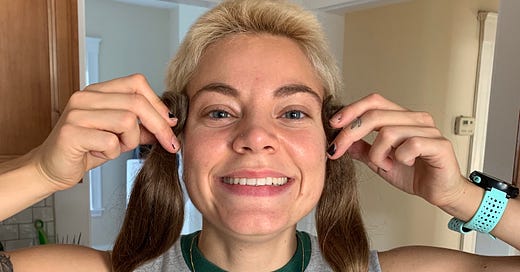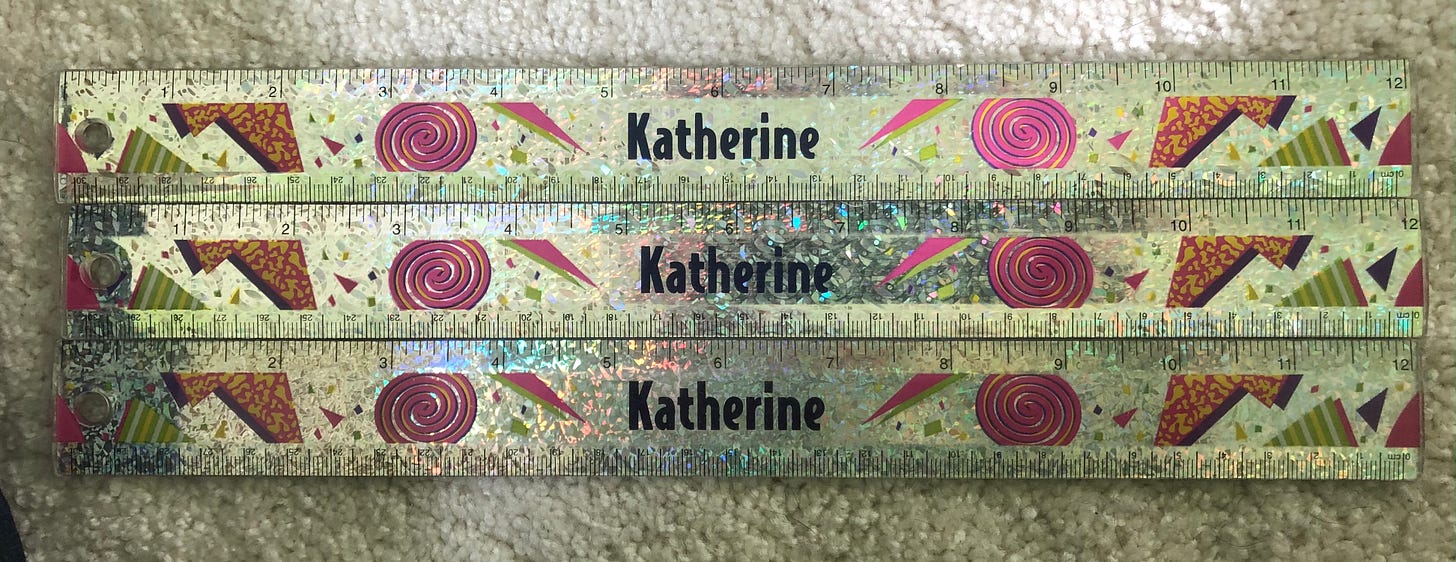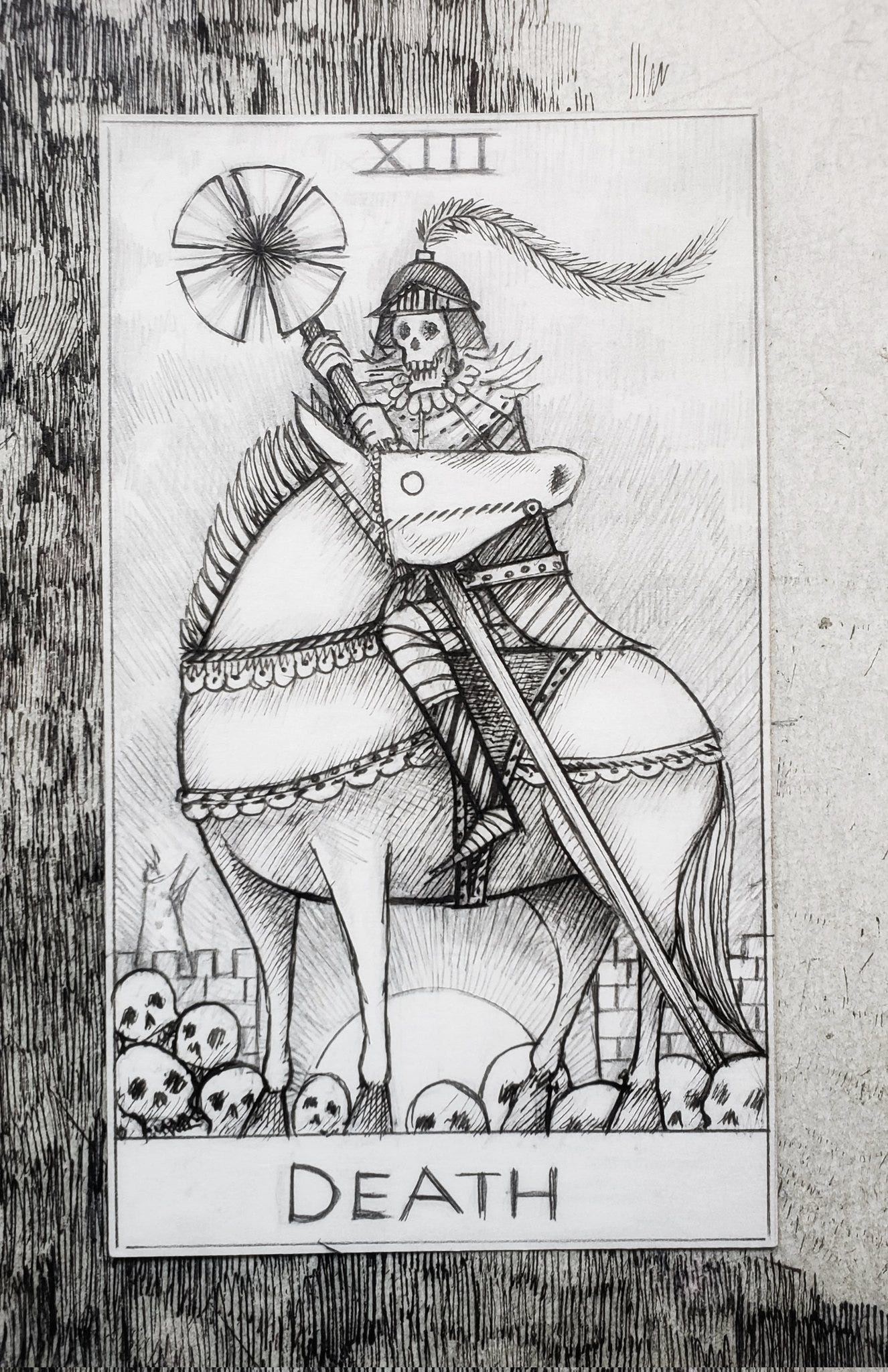Hello from the bleak midwinter, and thank you for supporting this newsletter. If you enjoy reading it, consider sharing with a friend—it could be a little treat in their inbox.
One sunny Saturday last April, I visited my friend in Portland, Maine and gave her a stick and poke tattoo of a codfish. I concentrated on the process, pushing my needle into her skin for more than an hour. Meanwhile, on the other side of the room, my phone was blowing up.
I finished the tattoo, peeled off my latex gloves, and checked my phone to find thousands of Twitter notifications.
A few days earlier, I’d published an essay in a small queer Canadian magazine, Xtra Mag, about the experience of my then-boyfriend cutting my hair. The haircut had been validating of my bisexual identity when I was in a straight-passing relationship, relatively isolated from my queer community. I’d intended to communicate what felt affirming to me during a difficult pandemic winter, and how this action had strengthened my relationship and made me feel at home in my body. The backlash was evidence that many people had not read the essay in that light.
The Xtra editors gave the essay a title similar to the inflammatory subject line I’d pitched to them (“My straight boyfriend gave me a queer pandemic haircut”), and the result was a piece of gorgeous gorgeous clickbait.

Quote tweets piled on, and I read every comment and mention. Most of them were dripping with biphobia. Many commenters claimed that there is no such a thing as a “queer haircut.” A lot of folks accused me of narcissism. Others denounced the essay as bad writing. A few comments were outright threatening, and Xtra took those down. Still, people DM’d me. They found my other social accounts and commented on old posts. They memed and memed and memed the article. The trolls had come for me; after all, I had given them a feast.
As I waded through the onslaught, I found that the tweets that came from straight people were easier for me to ignore, but the ones that came from the LGBTQ+ community split me open and exposed my deepest insecurities. It was isolating to hear them call me straight, to feel like the people who (I thought) had embraced me and all my weirdness were now shutting me out of their world.
And amid the endless scroll, I started to wonder if they were right. The essay had triggered so much hate, so much visceral disgust that it felt like there had to be truth in the comments. People called me out on the fact that I failed to acknowledge my privilege: I’m able to safely broadcast my queerness when many people don’t have that option. That’s a fair critique. I can pass as straight, but I make an active choice not to. A lot of queer folks don’t get to choose whether they look queer, and people have lost their jobs or been hate-crimed or beaten or killed because of that.
People critiqued the writing, and those criticisms are fair, too. Once something is published, people are allowed to respond to it. I look back on the essay and wish I’d written it differently: some of the writing is lazy; some is cliched; some is overwritten. I could have done better. But the dirty secret is that sometimes I write about what means the world to me, and sometimes I write to make a buck and a byline. This essay did mean a lot to me, but I didn’t spend a huge amount of time on it, and I let myself get sloppy. If I want to be a writer, if I want to say what I mean, I cannot afford to get sloppy.
Some people called me an attention whore, and I heard the truth there as well—I have a need to feel seen and publish a personal essay about myself. I’d centered my experience as a white, cis bi woman with a boyfriend. There’s a lot of biphobia floating around the Twitterverse (and the world), and this translates to bi women experiencing the highest rates of intimate partner violence compared to lesbian and heterosexual women. But on an individual level, more important than asking people to read my own little personal essay is the act of decentering myself and focusing on the fight for trans lives, amplifying the voices and stories of queer people of color, and dismantling the racism, ableism, and many phobias present within and outside of the LGBTQ movement. I think those actions serve all of us, bisexuals very much included.
A few weeks after the Twitterstorm, my mom sent me an episode of The Ezra Klein Show that focused on cancel culture. I hadn’t so much been “canceled” as publicly humiliated, but the overwhelming emotion I experienced, which I think is often the product of a cancel culture pile-on, was social shame.
On the podcast, Ezra Klein hosts Natalie Wynn, a trans woman and YouTuber who was canceled after a series of controversial tweets and a YouTube video featuring Buck Angel. Klein asks her how it feels to be canceled and Wynn says,
I mean, it feels incredibly isolating, alienating, you feel incredibly angry because you feel that you’ve been deliberately misunderstood. There’s a reason that public humiliation and exile have been used as punishment. In most societies, it really sort of triggers a lot of the worst social emotions that we’re capable of feeling.
When my essay exploded on Twitter, I was already clinically depressed and in the middle of my intensive outpatient eating disorder program. I’d gone to Maine to visit my friend for 48 hours and pretend like my life in Boston wasn’t happening. Instead, the world followed me to Portland, crawling into my mentions and shoving personal takedowns in front of my eyes. In the days that followed, I did not want to exist.
Twitter, especially, incubates this mob mentality. Will Wilkinson, another canceled guest on Klein’s show says,
This thing starts trending, or they see other people that they follow complaining about a particular article or about the particular horrible thing that somebody did, and they just chip in their two cents just to feel like they’re involved, and sometimes that scales up to something that’s really traumatic for the person who’s on the receiving end of it.
I don’t write any of this to engender sympathy. I needed sympathy and support in the days and weeks that followed, and I got it—from my roommates, from my friend in Maine, from my mom, my then-boyfriend who had cut my hair when I first asked him to (with no knowledge that the essay I would write about the experience would implicate him, too).
But from the perspective of where I’m writing today, the whole debacle was a learning experience. I hate that Twitter is designed so that the algorithm accelerates everything into an avalanche of toxicity, and I hate that folks are so eager to pile on, so ready to persecute someone (and sometimes the wrong someone) without engaging in a more nuanced conversation.
But what I also dislike is that the overwhelming negative response blinded me to the people who had responded positively. Some folks, straight and queer people, resonated with the essay. A college crush I hadn’t heard from in years reached out to say, “You are valid and welcome in queer spaces even if the viral mill on the internet is putrid.” A bisexual man I’ve never met wrote an essay in response to the Twitter backlash.
For months after I wrote that piece, I wished I’d never even pitched it. The resounding negative response made me want to dig a grave for my writing career rather than examine what I could have done better. It took me a long time to process how I wish I’d written it differently. But I no longer wish I hadn’t written it.
Any sort of long-term objective, like my wanting to be a writer, represents a commitment to incremental improvement. I am perpetually in draft form. When I look back at essays I wrote years ago, even articles I wrote a few months ago, I see them with a different perspective because I have learned and evolved. I didn’t do anything “wrong” in writing that essay about my haircut; aspects of it were short-sighted, but I wrote it in good faith. Not every profession requires you to expose your early self in draft form, but writing does. And the Twitterverse leaves little room for growth and learning: you are right or you are wrong; you are praised or you are canceled. The viral mill on the internet is indeed putrid.
But even putrescence fades. The haircut essay is still a sore spot for me, and I fear that people will remember my name in association with that essay, but internet memory is short (or at least that’s what I tell myself), and if you’re reading this, you’ve stayed with me. So I’ll keep writing.
Fortnightly Faves (picks from the last two weeks)
New King Princess/Fousheé song which hits like vintage KP. I’m in love, and it’s on loop.
This dose of childhood nostalgia courtesy of my mom. These rulers did not, in fact, make me instantly cool.
Jon Carling’s whimsical tarot card renditions. He’s been tweeting a new card every few days. His Death card is perfect, and I can’t wait to see the High Priestess.
How the Ballpoint Pen Killed Cursive. This article isn’t new, but it’s short and charming and pulled me out of a funk of “everything is awful.” Perhaps I resonated with it especially because I hold pens quite unconventionally, and though my kindergarten teacher tried to coax me into writing the “correct way,” I held on with an iron grip. (If you’re looking for new things to read, I recommend Refind—that’s how I came across this article.)
This American Life’s first episode of 2022: The Ghost in the Machine. My mom sent this episode to me (can you see a pattern?) and we both loved the last act in particular, in which a dad regularly calculates the Average Family Location based on where each member of the family sleeps on any given night.








It always baffles my mind how much time people are willing to waste on hating others. There are so many more valuable and interesting things they could be doing instead.
I'm sorry you had to endure that, but I have a feeling you came out of it stronger, so there's the silver lining I guess.
Let me start with a couple of easy softballs (both honest questions):
1. Re: "Queer haircut" this was used derisively when I was growing up. I assume that's still true, or has it been co-opted by the LGBT community?
2. Stick-and-poke tats: Another thing from the early 90s I didn't realize was still at thing. Is it? Lots of "ZOSO" and VW logos on people my age.
As for the article itself:
I'm an avowed leftie, but find the woke mob exhausting and tedious (often both). It's a crowd hellbent on applying higher and higher levels of orthodoxy and then eating it's own over the smallest infraction. For a group that prides itself of calling out every last thing offensive or violent, they sure do a good job of treating each other like shit. IMO, /that/ is actually harmful.
I also have to believe that much of the ire directed at you was (at some level) due to jealousy. Twitter is awash in the crab-in-a-bucket mindset, and you wrote right past that. You are/were in a healthy relationship, trusted your partner enough to have him cut your hair, and were comfortable enough to share it all with world. I know you acknowledge that in the essay, but it's worth repeating. It's also worth saying that as another internet rando, I salute you for it. All of it.
P.S. Old town Portland holds fond summer memories for me. Thanks for the trip down memory lane on this sub-zero morning!